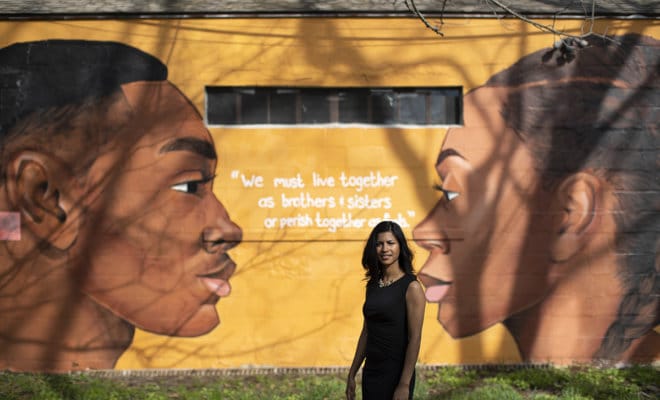Life
Teaching Gandhi’s Nonviolent Principles in a Violent Time

Maria Engles, a youth educator at the M.K. Gandhi Institute for Nonviolence, in Rochester, N.Y. Her job is educating young people to treat others with respect. The goal is ambitious: eradicating hunger, homelessness, acts of hate and violence.
Photo: Brett Carlsen/The New York Times
Stepping away from one’s preoccupation with consumerism and capitalism, instead putting time and energy into such issues as treating each other with respect and humanity.
Maria Engels, 27, is a youth educator at the M.K. Gandhi Institute for Nonviolence in Rochester, New York.
Q: Why did you become involved in this organization?
A: My desire to do this kind of work was crystallized when I was 13 years old, during a trip to visit St. Benedict’s Nursery, the orphanage in Chittagong, Bangladesh, from which I’d been adopted at the age of 18 months. I’m told my biological parents came from the untouchable caste, the lowest in India.
Instead, I grew up in a comfortable setting in Rochester, with loving parents and two brothers. I was so deeply moved to see the life I could have been living that I decided to help others less fortunate than me through social justice causes.
Q: How did that lead you to the institute?
A: In my senior year at Clark University, I helped run a yearlong course, “Difficult Dialogues,” which shaped my understanding of how communication skills can improve relationships.
Later, working at Juniata College as the assistant dean of admissions, I attended a four-day nonviolence intensive program sponsored by the M.K. Gandhi Institute. It’s an off-campus affiliate of the University of Rochester, offering programs and services in exchange for some university funding.
A moving conversation with the director, Kit Miller, rerouted my direction. I moved back to Rochester, volunteered and eventually was hired at the institute, inspired by its core values.
Q: Which are what?
A: The values are rooted in Mahatma Gandhi’s philosophy of principled nonviolence.
It requires first stepping away from one’s preoccupation with consumerism and capitalism, instead putting time and energy into such issues as treating each other with respect and humanity.
Q: What are you doing to foster these ideals?
A: I’ve worked with seventh to ninth graders at James Monroe High School in Rochester learning skills around conflict resolution and restorative practices, showing them how to repair damage done over thoughtless words or actions. And I led the Gandhi Service Fellowship Program, which focuses on nonviolence service projects for university undergraduates.
This year, I am working with a granting program called Youth Healing Hate; we’ve funded 15 projects that use creative educational techniques to find alternatives to fear, hostility and divisiveness.
Q: Can you gauge such programs’ success?
A: In follow-up surveys, we found that after one semester, Monroe High School had a 66 percent decrease in visits to conflict resolution spaces reserved for behavioral issues. At another school, Enrico Fermi Elementary School No. 17, the suspension rate dropped by 35 percent in one year. And in Northwest Junior High School, where we taught daily social justice classes, we found a 40 percent increase in students’ ability to imagine how things look from someone else’s perspective.
Q: Is it possible today to follow the moral principles Gandhi set down decades ago?
A: We are living through challenging times, but I believe change is possible if enough people learn how to re-engage with each other according to Gandhi’s principles.
But, as Gandhi suggested, if we have to push our agenda for nonviolence or anything else, it will be met with resistance.
If we work together to eradicate hunger, homelessness, acts of hate and violence — if we focus on constructive rather than obstructive behaviors — Gandhi’s vision is achievable.
© 2018 New York Times News Service
